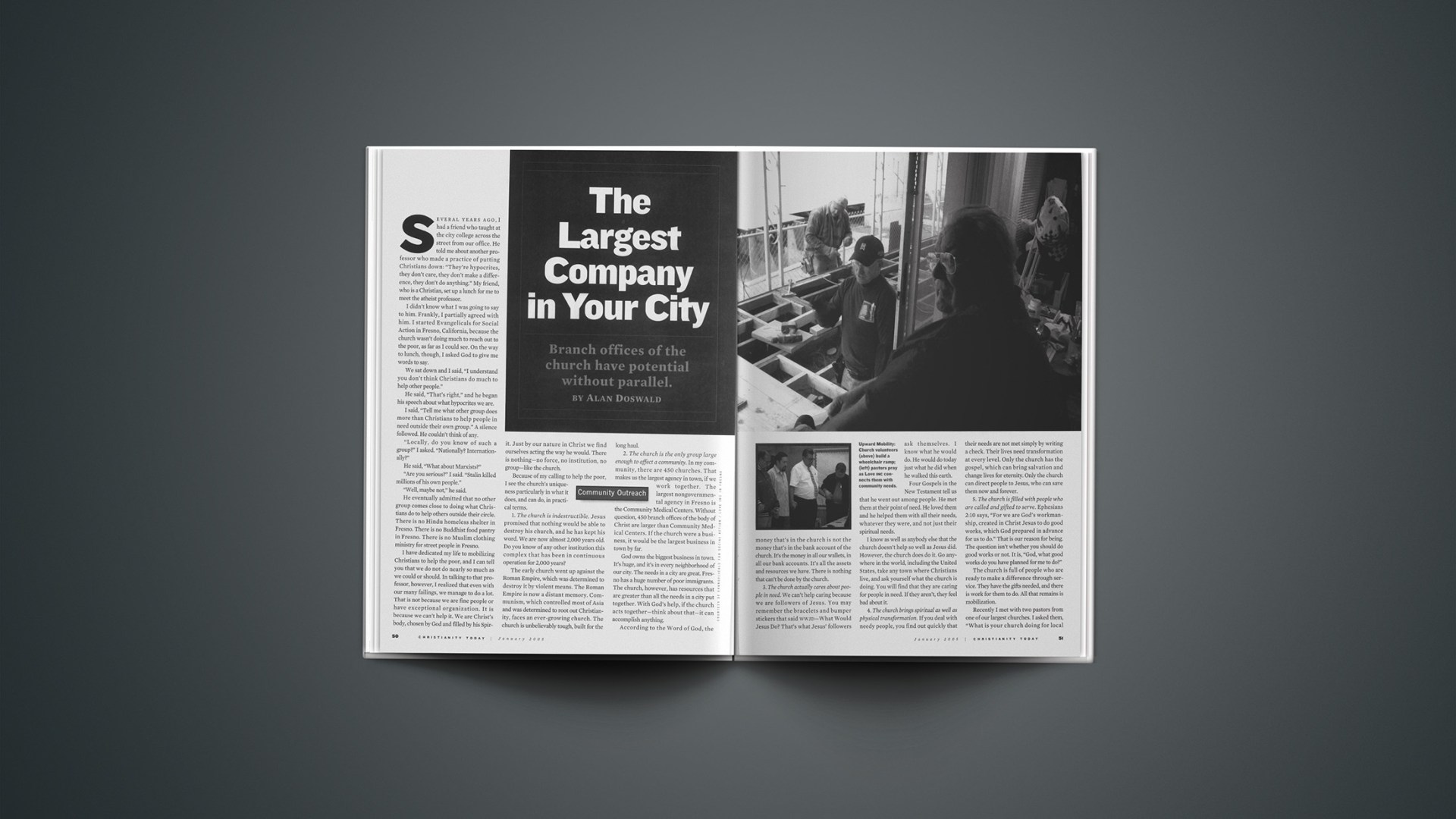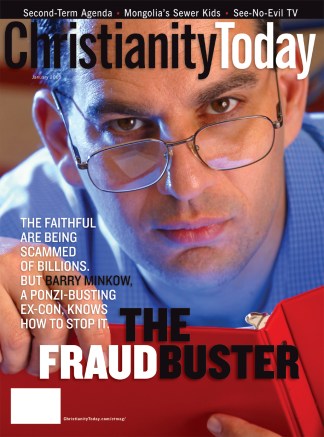Several years ago, I had a friend who taught at the city college across the street from our office. He told me about another professor who made a practice of putting Christians down: “They’re hypocrites, they don’t care, they don’t make a difference, they don’t do anything.” My friend, who is a Christian, set up a lunch for me to meet the atheist professor.
I didn’t know what I was going to say to him. Frankly, I partially agreed with him. I started Evangelicals for Social Action in Fresno, California, because the church wasn’t doing much to reach out to the poor, as far as I could see. On the way to lunch, though, I asked God to give me words to say.
We sat down and I said, “I understand you don’t think Christians do much to help other people.”
He said, “That’s right,” and he began his speech about what hypocrites we are.
I said, “Tell me what other group does more than Christians to help people in need outside their own group.” A silence followed. He couldn’t think of any.
“Locally, do you know of such a group?” I asked. “Nationally? Internationally?”
He said, “What about Marxists?”
“Are you serious?” I said. “Stalin killed millions of his own people.”
“Well, maybe not,” he said.
He eventually admitted that no other group comes close to doing what Christians do to help others outside their circle. There is no Hindu homeless shelter in Fresno. There is no Buddhist food pantry in Fresno. There is no Muslim clothing ministry for street people in Fresno.
I have dedicated my life to mobilizing Christians to help the poor, and I can tell you that we do not do nearly so much as we could or should. In talking to that professor, however, I realized that even with our many failings, we manage to do a lot. That is not because we are fine people or have exceptional organization. It is because we can’t help it. We are Christ’s body, chosen by God and filled by his Spirit. Just by our nature in Christ we find ourselves acting the way he would. There is nothing—no force, no institution, no group—like the church.
Because of my calling to help the poor, I see the church’s uniqueness particularly in what it does, and can do, in practical terms.
1. The church is indestructible. Jesus promised that nothing would be able to destroy his church, and he has kept his word. We are now almost 2,000 years old. Do you know of any other institution this complex that has been in continuous operation for 2,000 years?
The early church went up against the Roman Empire, which was determined to destroy it by violent means. The Roman Empire is now a distant memory. Communism, which controlled most of Asia and was determined to root out Christianity, faces an ever-growing church. The church is unbelievably tough, built for the long haul.
2. The church is the only group large enough to affect a community. In my community, there are 450 churches. That makes us the largest agency in town, if we work together. The largest nongovernmental agency in Fresno is the Community Medical Centers. Without question, 450 branch offices of the body of Christ are larger than Community Medical Centers. If the church were a business, it would be the largest business in town by far.
God owns the biggest business in town. It’s huge, and it’s in every neighborhood of our city. The needs in a city are great. Fresno has a huge number of poor immigrants. The church, however, has resources that are greater than all the needs in a city put together. With God’s help, if the church acts together—think about that—it can accomplish anything.
According to the Word of God, the money that’s in the church is not the money that’s in the bank account of the church. It’s the money in all our wallets, in all our bank accounts. It’s all the assets and resources we have. There is nothing that can’t be done by the church.
3. The church actually cares about people in need. We can’t help caring because we are followers of Jesus. You may remember the bracelets and bumper stickers that said WWJD—What Would Jesus Do? That’s what Jesus’ followers ask themselves. I know what he would do. He would do today just what he did when he walked this earth.
Four Gospels in the New Testament tell us that he went out among people. He met them at their point of need. He loved them and he helped them with all their needs, whatever they were, and not just their spiritual needs.
I know as well as anybody else that the church doesn’t help so well as Jesus did. However, the church does do it. Go anywhere in the world, including the United States, take any town where Christians live, and ask yourself what the church is doing. You will find that they are caring for people in need. If they aren’t, they feel bad about it.
4. The church brings spiritual as well as physical transformation. If you deal with needy people, you find out quickly that their needs are not met simply by writing a check. Their lives need transformation at every level. Only the church has the gospel, which can bring salvation and change lives for eternity. Only the church can direct people to Jesus, who can save them now and forever.
5. The church is filled with people who are called and gifted to serve.Ephesians 2:10 says, “For we are God’s workmanship, created in Christ Jesus to do good works, which God prepared in advance for us to do.” That is our reason for being. The question isn’t whether you should do good works or not. It is, “God, what good works do you have planned for me to do?”
The church is full of people who are ready to make a difference through service. They have the gifts needed, and there is work for them to do. All that remains is mobilization.
Recently I met with two pastors from one of our largest churches. I asked them, “What is your church doing for local missions?”
They told me about their budget. They give to the Rescue Mission, to Evangel Home, and to a food ministry.
“No, no,” I said. “That’s not what I’m asking. It’s important that you give money to those organizations. They need your support. What I’m asking is, what is your church doing to help your people become local missionaries?”
They pastor a huge church with a concern for foreign missions. They both sat there, silent. They had no structure for their church members to become missionaries in their own community.
The past couple of years saw a publishing phenomenon, Rick Warren’s The Purpose-Driven Life. Literally millions of people read it. Now, presumably, they understand that their purpose in life is wrapped up in the Great Commission and the Great Commandment. My concern is that most of their churches don’t offer them much structure to help them fulfill their God-given purpose. Without a structure, I fear that their discovery of purpose will be short-lived.
Making Connections
Traditionally, when Christians discover a need they start a new program. Either they do it within their own church, or they go outside their church and launch a new organization. In Fresno, we lean on a model that uses the organizations and church structures that already exist. It’s simple: the Love in the Name of Christ (Love INC) model, which is a network of churches using a clearinghouse to serve their city together.
In Fresno (as in 120 other U.S. communities) a network of congregations has organized under the auspices of Love INC. Based in Minneapolis, Love INC has been in existence for 27 years.
The idea is almost too obvious. The local church works with the Love INC staff to identify what gifts and talents are available in the congregation to help others. People in need contact Love INC. If someone needs clothes for school, or groceries, or car repair, or tutoring after school, Love INC’s trained volunteers make sure the need is valid. They then locate the church that’s nearest the person and best able to help. Love INC connects the right church volunteers to meet those needs. Local church members go to work, getting involved in the needs of their neighbors.
James 1:27 is interesting. If you asked most people what true religion is, they would not give this answer. It says, “Religion that God our Father accepts as pure and faultless is this: to look after orphans and widows in their distress and to keep oneself from being polluted by the world.”
If we’re not caring for widows and orphans, we’re already polluted by the world, because the world doesn’t care either. The church’s very nature, however, is to care. The church has demonstrated this many times over.
The vital role of the church is to love our neighbors in the way Jesus loved them. We are doing it; we can’t help it. My prayer is that through a network of churches like Love INC, and through any other method we can arrive at, we will mobilize to do what only we can do.
The chuch is indestructible. We have the resources. We care. We have a spiritual and practical balance. We have the gifts and the opportunities. The church is life and death in its community. Our vital role is not realized, however, until we are mobilized.
Alan Doswald is executive director of Evangelicals for Social Action/Love INC in Fresno, California. For more information, see www.loveinc.org, or call 800.777.5277.
Copyright © 2005 Christianity Today. Click for reprint information.
Related Elsewhere:
Our December cover story, New York’s New Hope, showed churches developing run-down neighborhoods and becoming integral to life in New York City.
Recent Christianity Today articles about needing the Body of Christ include:
The Church—Why Bother? | There is no healthy relationship with Jesus without a relationship to the church. (Jan. 06, 2005)
Why I Return to the Pews | The church has often left me bemused, bored, or mystified, but I can no more abandon it than I can myself. (Dec. 16, 2004)
Editor’s Bookshelf: Survival Through Community | An interview with Charles Colson, author of Being the Body. (May 19, 2003)










